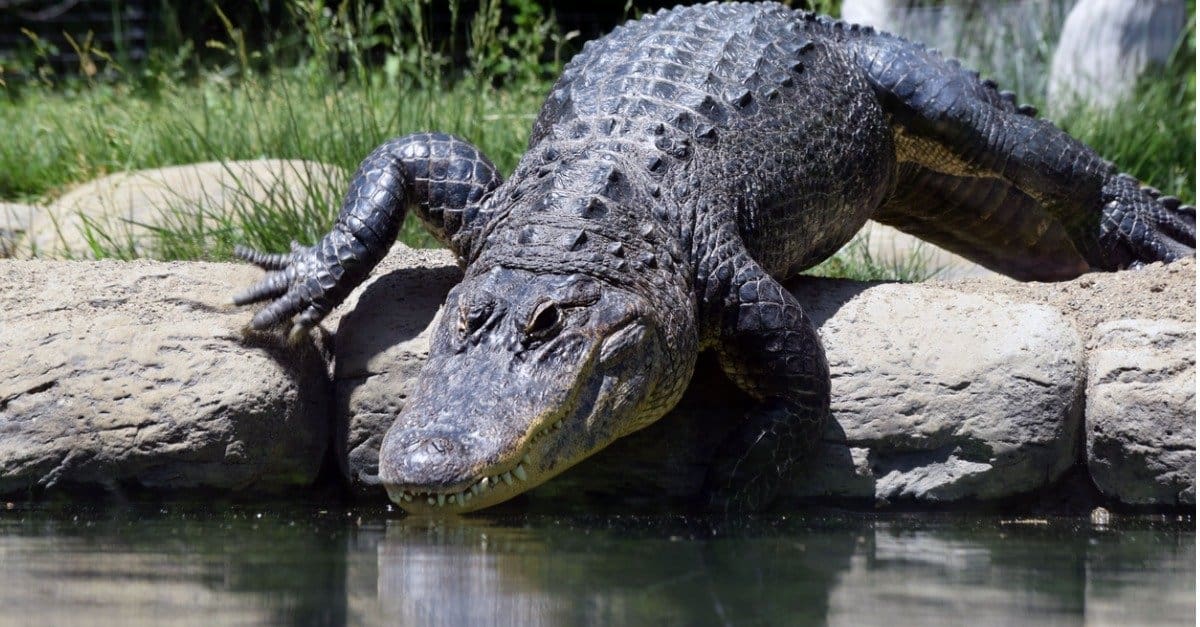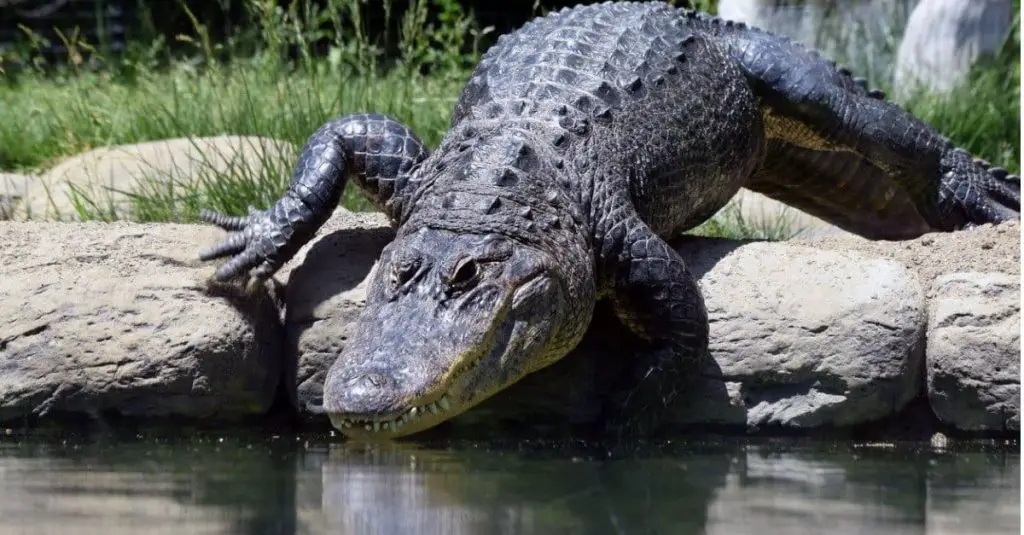Alligators are fascinating creatures that have been around for millions of years. They are known for their powerful jaws, armored bodies, and their ability to stay submerged underwater for long periods. But just how long can an alligator hold its breath?
In this article, we will explore the amazing abilities of alligators and their adaptations that allow them to stay underwater for extended periods. We will also look at some of the factors that affect how long alligators can hold their breath, including their size, age, and physical condition. So, let’s dive into the world of alligators and find out just how long they can stay submerged!
Alligators can stay underwater for up to two hours without coming up for air. Their nostrils close to keep water out, and they can slow their heart rate to conserve oxygen. When they do come up for air, they take a quick breath and then dive back down.

How Long Can Alligators Stay Under Water?
Alligators are fascinating creatures that have captured the attention of people all over the world. These reptiles have many unique characteristics that make them stand out from other animals, one of which is their incredible ability to stay underwater for extended periods. In this article, we will explore how long alligators can stay underwater and what makes them such impressive creatures.
The Physiology of Alligators
Alligators are reptiles that belong to the crocodilian family. They are cold-blooded, which means that their body temperature is regulated by the environment around them. Alligators are also adapted to living in water, which is why they have a streamlined body shape and webbed feet.
One of the unique features of alligators is their ability to hold their breath for a long time. Alligators have a special valve in their throat called the glottis, which allows them to close off their airway when they are underwater. This valve prevents water from entering their lungs, allowing them to stay underwater for extended periods.
Alligators also have a slower metabolism than other animals, which means that they do not need as much oxygen to survive. This adaptation allows them to stay underwater for a longer time without needing to come up for air.
How Long Can Alligators Stay Underwater?
Alligators can stay underwater for a considerable amount of time, with some species being able to hold their breath for up to two hours. However, the average time that alligators can stay underwater is closer to 20-30 minutes.
The amount of time that alligators can stay underwater varies depending on a variety of factors, including their size, age, and health. Larger alligators can hold their breath for longer periods than smaller ones, while younger alligators may not be able to hold their breath as long as adults.
It is also essential to note that alligators do not need to stay underwater for extended periods to survive. Alligators are cold-blooded, which means they have a slower metabolism than other animals. This adaptation allows them to survive for extended periods without needing to eat or breathe, making them well-suited to their aquatic lifestyle.
The Benefits of Alligators Being Able to Stay Underwater
Alligators’ ability to stay underwater for extended periods has several benefits. One of the most significant benefits is that it allows them to hunt more effectively. Alligators are ambush predators that wait for their prey to come to them. Being able to stay underwater for extended periods allows them to stay hidden and wait for their prey to come close, increasing their chances of a successful hunt.
The ability to stay underwater for extended periods also allows alligators to escape predators more effectively. If an alligator is being chased by a predator, it can quickly submerge itself underwater and stay hidden for an extended period, making it more challenging for the predator to find it.
Alligators vs. Other Aquatic Animals
Alligators are not the only aquatic animals that can hold their breath for extended periods. Other animals, such as dolphins and whales, can also stay underwater for a long time. However, alligators are unique in that they can stay underwater for longer without needing to come up for air.
Fish are another group of aquatic animals that are adapted to living in water. However, fish need to constantly move through the water to breathe, while alligators can stay still and hold their breath, making them more efficient hunters.
Conclusion
In conclusion, alligators are impressive creatures that have many unique adaptations that make them well-suited to their aquatic lifestyle. Their ability to stay underwater for extended periods is one of their most impressive features, allowing them to hunt and escape predators more effectively. Understanding the physiology of alligators and their unique adaptations is essential for appreciating these fascinating creatures and their place in the natural world.
Frequently Asked Questions
Find out everything you need to know about alligators and how long they can stay under water with these frequently asked questions.
What is the average length of time that an alligator can stay underwater?
Alligators can stay underwater for an average of 15-20 minutes at a time. This is because they have a special valve in their throats that allows them to close off their airways while they are submerged. This helps them to conserve oxygen and stay underwater for longer periods of time.
However, it is important to note that the length of time that an alligator can stay underwater can vary depending on a number of factors, such as their size, age, and overall health. Younger alligators tend to be able to stay underwater for shorter periods of time, while larger, older alligators can stay underwater for longer periods of time.
How do alligators breathe while they are underwater?
Alligators have a special adaptation that allows them to breathe while they are underwater. They have a valve in their throats that allows them to close off their airways while they are submerged. This helps them to conserve oxygen and stay underwater for longer periods of time.
In addition to this, alligators can also absorb oxygen through their skin. This allows them to extract oxygen from the water that they are submerged in, which can also help them to stay underwater for longer periods of time.
What is the longest amount of time that an alligator has been known to stay underwater?
While the average length of time that an alligator can stay underwater is around 15-20 minutes, there have been instances where alligators have been known to stay underwater for much longer periods of time. In fact, the longest recorded dive for an alligator was just over two hours!
This impressive feat was accomplished by an alligator in Louisiana, who was able to stay underwater for a total of two hours and eight minutes. While this is an exceptional case, it does demonstrate just how long alligators are capable of staying underwater when they need to.
Why do alligators stay underwater for long periods of time?
Alligators stay underwater for long periods of time for a number of reasons. One reason is that they use the water as a way to escape from predators. They can quickly dive underwater and stay there for an extended period of time, which can help them to avoid being caught by predators.
In addition to this, alligators also use the water as a way to regulate their body temperature. By staying in the water, they can cool down their bodies and avoid overheating. This is particularly important during the hot summer months when temperatures can reach dangerous levels.
What happens if an alligator stays underwater for too long?
If an alligator stays underwater for too long, they can begin to experience a number of negative effects. One of the most immediate effects is that they can begin to suffer from oxygen deprivation. This can lead to a number of symptoms, such as dizziness, confusion, and even loss of consciousness.
In addition to this, staying underwater for too long can also have other negative effects on the alligator’s health, such as causing damage to their lungs and other organs. For this reason, it is important for alligators to come up for air regularly and not stay underwater for extended periods of time.
How Long Can An Alligator Stay Underwater? #shorts
In conclusion, the question of how long alligators can stay underwater is a fascinating one. While some experts believe they can stay submerged for up to two hours, others argue that this is unlikely. Regardless, there is no denying that alligators are incredibly well-adapted to life in the water, with streamlined bodies, powerful lungs, and a range of other adaptations that make them formidable predators.
Despite their fearsome reputation, however, alligators are also an important part of many ecosystems, playing a vital role in maintaining the balance of their habitats. Whether you are a scientist studying these creatures, a nature lover admiring them from afar, or simply someone who enjoys learning about the natural world, there is no denying that alligators are truly fascinating creatures that deserve our respect and admiration.
So next time you’re near a swamp or river, keep your eyes peeled for these amazing creatures – you never know what you might learn! And remember, while alligators may be powerful predators, they are also an important part of the natural world, and it is up to all of us to ensure that they continue to thrive for generations to come.


